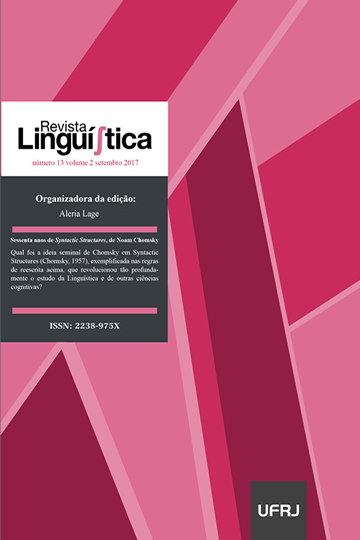The emergence of Brazilian Portuguese: earlier evidence for the development of a partial null subject Grammar
DOI:
https://doi.org/10.31513/linguistica.2017.v13n2a14033Resumo
Brazilian Portuguese (henceforth, BP) is currently analyzed as a partial null subject language (NSL). This work shows the earliest attested changes in the properties of null subjects in the Goiás dialect of BP. We analyze original data from colonial period manuscripts written in Goiás, a state located in Brazil's center-west region, and provide empirical evidence of the loss of null subjects in BP grammars in historical data between the 18th and 19th century, preceding the period for which these changes have been reported regarding other dialects of BP. The analysis of our 18th and 19th century corpus shows an early signifcant rise in the realization of overt subjects. In addition, the loss of verbsubject (VS) free inversion, a property common to NSLs, drops from 57% in the 18th century to only 22.5% in the 19th century. On the other hand, a potential impoverishment of the verbal paradigm did not play a signifcant role in this early rise of overt subjects: only 15% of the clauses with a plural external argument in the 19th century data did not show overt agreement between the verb and the external argument, and all of them occur strictly with unaccusative or existential verbs. We take this as evidence that the loss of null subjects in BP was primarily linked to the loss of free VS-inversion, and not to the loss of clausal agreement. We propose that D-feature in T (an EPP-feature) was valued by V-movement to T in the 18th century, yielding a consistent NSL. We argue that the loss of the requirement of the D-feature in T(tense) was a primary trigger for the partial loss of null subjects and parallel loss of free inversion from the 18th to the 19th century in Goiás BP, giving then rise to a partial NSL (without a D-feature in T).
---
DOI: http://dx.doi.org/10.31513/linguistica.2017.v13n2a14033
Downloads
Downloads
Publicado
Edição
Seção
Licença
Autores que publicam na Revista Linguí∫tica concordam com os seguintes termos:
Os autores mantêm os direitos e cedem à revista o direito à primeira publicação, simultaneamente submetido a uma licença Creative Commons que permite o compartilhamento por terceiros com a devida menção ao autor e à primeira publicação pela Revista Linguí∫tica.
Os autores podem entrar em acordos contratuais adicionais e separados para a distribuição não exclusiva da versão publicada da obra (por exemplo, postá-la em um repositório institucional ou publicá-la em um livro), com o reconhecimento de sua publicação inicial na Revista Linguí∫tica.

A Revista Linguí∫tica é uma revista do Programa de Pós-Graduação em Linguística da UFRJ e se utiliza da Licença Creative Commons - Atribuição-NãoComercial 4.0 Internacional (CC-BY-NC)









